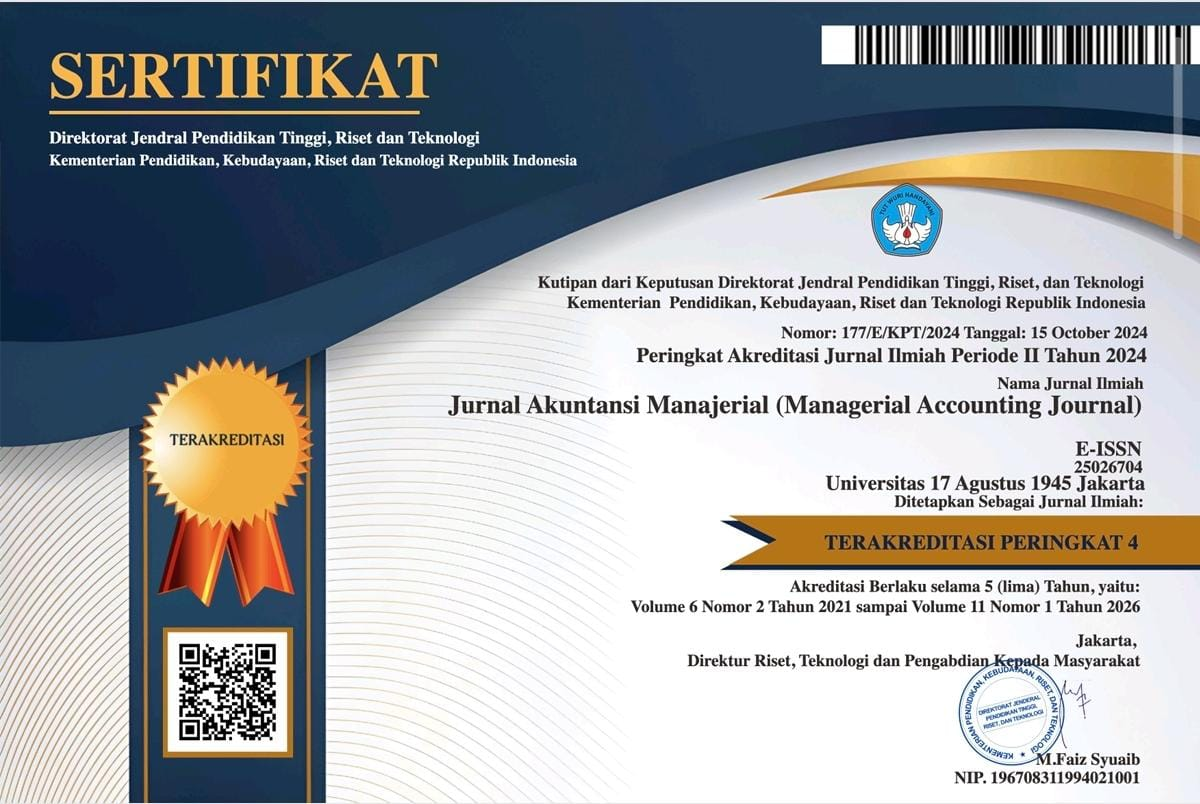Pengaruh Thin Capitalization Dan Capital Intensity Terhadap Penghindaran Pajak
Abstract
This study aims to analyze the influence of thin capitalization and capital intensity on tax avoidance. It focuses on multinational companies within the manufacturing sector that are listed on the Indonesia Stock Exchange (IDX) over a period of six years, specifically from 2018 to 2023. The research employs a nonprobability sampling method, utilizing purposive sampling techniques to select from the existing population of firms. The data utilized in this study consists of secondary data sourced from the financial statements of the companies involved. Additionally, the study is grounded in the Theory of Planned Behavior (TPB), which serves as a theoretical framework to elucidate managerial behavior regarding tax avoidance practices. The findings reveal that thin capitalization has a significant impact on tax avoidance, indicating that companies with lower capital ratios are more likely to engage in tax avoidance strategies. In contrast, capital intensity does not demonstrate a significant effect on tax avoidance, suggesting that the level of capital investment does not play a crucial role in these practices among the companies analyzed
Keywords
Full Text:
PDFReferences
Afifah, Siti Nasaihatul, and Dewi Prastiwi. 2019. “Pengaruh Thin Capitalization Terhadap Penghindaran Pajak.” AKUNESA: Jurnal Akuntansi Unesa 7 (3): 1–7. http://jurnalmahasiswa.unesa.ac.id/index.php/jurnal-akuntansi/.
Cabello, O. G., Gaio, L. E., & Watrin, C. (2019). Tax avoidance in management-owned firms: evidence from Brazil. International Journal of Managerial Finance, 15(4), 580-592.
Dwiyanti, Ida Ayu Intan, and I Ketut Jati. 2019. “Pengaruh Profitabilitas, Capital Intensity, Dan Inventory Intensity Pada Penghindaran Pajak.” E-Jurnal Akuntansi 27: 2293. https://doi.org/10.24843/eja.2019.v27.i03.p24.
Dharma, N. B. S., & Noviari, N. (2017). Pengaruh corporate social responsibility dan capital intensity terhadap tax avoidance. E-Jurnal Akuntansi Universitas Udayana, 18(1), 529-556.
Erie Dharmawan, Purwoko, Syahril Djaddang, and Darmansyah Darmansyah. 1970. “Determinan Penghindaran Pajak Dengan Corporate Social Responsibility Sebagai Variabel Moderasi.” Jurnal Riset Akuntansi & Perpajakan (JRAP) 4 (02): 182–94. https://doi.org/10.35838/jrap.2017.004.02.15.
Ferdiawan, Yopi, and Amrie Firmansyah. 2020. “Pengaruh Political Connection , Foreign Activity , Dan Real Earnings Management Terhadap Tax Avoidance Pendapatan Perpajakan Merupakan.” Jurnal Riset Akuntansi Dan Keuangan 5 (3): 1601–24.
Gaaya, Safa, Nadia Lakhal, and Faten Lakhal. 2017. “Does Family Ownership Reduce Corporate Tax Avoidance? The Moderating Effect of Audit Quality.” Managerial Auditing Journal 32 (7): 731–44. https://doi.org/10.1108/MAJ-02-2017-1530.
Hoseini, M., Safari Gerayli, M., & Valiyan, H. (2019). Demographic characteristics of the board of directors’ structure and tax avoidance: Evidence from Tehran Stock Exchange. International Journal of Social Economics, 46(2), 199–212.
Nugraha, R., & Kristanto, A. B. (2019). Faktor-Faktor Yang Mempengaruhi Pemanfaatan Tax Haven. 9(2), 196–206.
Mugarura, N. (2017). Tax havens, offshore financial centres and the current sanctions regimes. Journal of Financial Crime, 24(2), 200-222.
Pramesthi, R. D. F., Suprapti, E., & Kurniawati, E. T. (2019). Income Shifting and State Utilization Tax Haven. Journal of Accounting and Finance Review, 9(3), 375. https://doi.org/10.22219/jrak.v9i3.8866
Prastiwi, Dewi, and Renni Ratnasari. 2019. “The Influence of Thin Capitalization and The Executives’ Characteristics Toward Tax Avoidance by Manufacturers Registered on ISE in 2011-2015.” AKRUAL: Jurnal Akuntansi 10 (2): 119. https://doi.org/10.26740/jaj.v10n2.p119-134.
Pohan, C. A. (2017). Panama Papers dan Fenomena Penyelundupan Pajak Serta Implikasinya Terhadap Penerimaan Pajak Indonesia. Jurnal Ilmiah Untuk Mewujudkan Masyarakat Madani, 4 No. 2(September 2017), 51–66.
Rahayu, Ning. 2017. “Perkembangan Control Foreign Corporation (Cfc ) Rules Di Indonesia Dalam Upaya Mengamankan Penerimaan Negara Dari Sektor Pajak.” Jurnal Vokasi Indonesia 5 (2). https://doi.org/10.7454/jvi.v5i2.75.
Salwah, Siti, and Eva Herianti. 2019. “Pengaruh Aktivitas Thin Capitalization Terhadap Penghindaran Pajak.” JRB-Jurnal Riset Bisnis 3 (1): 30–36. https://doi.org/10.35592/jrb.v3i1.978.
Salehi, M., Ali Mirzaee, M., & Yazdani, M. (2017). Spiritual and emotional intelligences, financial performance, tax avoidance and corporate disclosure quality in Iran. International Journal of Law and Management, 59(2), 237-256.
Selistiaweni, Safitri, Dianwicaksih Arieftiara, and Samin. 2020. “Pengaruh Kepemilikan Keluarga, Kesulitan Keuangan, Dan Thin Capitalization Terhadap Penghindaran Pajak.” Business Management, Economic, and Accounting National Seminar 1 (1): 1059–76.
Syahidah, Sumayya, and Ning Rahayu. 2018. “Thin Capitalization Rules Di Indonesia, Studi Kasus Pada RS X.” Substansi: Sumber Artikel Akuntansi Auditing Dan Keuangan Vokasi 2 (2): 157. https://doi.org/10.35837/subs.v2i2.312.
Tarnaba, R. R., Tumirin (2024). PENGARUH INTENSITAS MODAL DAN TANGGUNG JAWAB SOSIAL TERHADAP PENGHINDARAN PAJAK DENGAN UKURAN PERUSAHAAN SEBAGAI VARIABEL PEMODERASI. 5(3), 575–586.
Widodo, Leony Larasati, Nur Diana, and M. Cholid Mawardi. 2020. “Pengaruh Multinasionalitas, Good Coorporate Governance, Tax Haven, Dan Thin Capitalization Terhadap Praktik Penghindaran Pajak Pada Perusahaan Multinasional Yang Terdaftar Di Bei Periode Tahun 2016-2018.” E-Jra 9 (6): 119–33.
Wiguna, I. P. P., & Jati, I. K. (2019). Pengaruh corporate social responsibility, preferensi risiko eksekutif, dan capital intensity pada penghindaran pajak. Target, 2014, 2015.
Yuniarti, Setiafitrie, Rizky Aldi Setianda, and Siti Fatimah. 2024. “The Effect of Return on Equity And Capital Intensity on Tax Avoidance with Corporate Governance as a Moderating Variable.” Nusantara Journal of Education and Social Science 1 (1): 32–40. https://doi.org/10.69959/nujess.v1i1.18.
Yuniarti, S., Setianda, R. A., & Fatimah, S. (2024). The Effect of Return on Equity And Capital Intensity on Tax Avoidance with Corporate Governance as a Moderating Variable. Nusantara Journal of Education and Social Science, 1(1), 32–40. https://doi.org/10.69959/nujess.v1i1.18
DOI: https://doi.org/10.52447/jam.v10i1.8308
Refbacks
- There are currently no refbacks.
View My Stats






